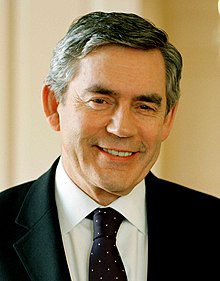

Prime Minister of the United Kingdom
20 February 1951 Giffnock, Renfrewshire, Scotland
-
27 June 2007 – 11 May 2010
Prime Minister of the United Kingdom from 2007 to 2010 For other people named Gordon Brown, see Gordon Brown (disambiguation). This article is part of a series about Gordon Brown Electoral history MP for Kirkcaldy and Cowdenbeath Shadow Chancellor Blair–Brown deal Chancellor of the Exchequer Chancellorship Policies Brownism New Labour Third Way Prime Minister of the United Kingdom Premiership 2007 leadership election Ministry 2008 financial crisis Bank rescue packages 2008 2009 Climate Change Act 2008 2009 European elections 2010 general election Post–Prime Minister My Life, Our Times vte James Gordon Brown HonFRSE (born 20 February 1951) is a British politician who served as Prime Minister of the United Kingdom and Leader of the Labour Party from 2007 to 2010. He served as Chancellor of the Exchequer in the Blair government from 1997 to 2007. Brown was a Member of Parliament (MP) from 1983 to 2015, first for Dunfermline East and later for Kirkcaldy and Cowdenbeath. He is the most recent Labour politician and most recent Scottish politician to hold the office of Prime Minister. A doctoral graduate, Brown read history at the University of Edinburgh, where he was elected Rector of the University of Edinburgh in 1972. He spent his early career working as both a lecturer at a further education college and a television journalist. He entered the British House of Commons in 1983 as the MP for Dunfermline East. He joined the Shadow Cabinet in 1989 as Shadow Secretary of State for Trade, and was later promoted to become Shadow Chancellor of the Exchequer in 1992. After Labour's victory in 1997, he was appointed Chancellor of the Exchequer, becoming the longest-serving holder of that office in modern history. Brown's tenure as Chancellor was marked by major reform of Britain's monetary and fiscal policy architecture, transferring interest rate setting powers to the Bank of England, by a wide extension of the powers of the Treasury to cover much domestic policy and by transferring responsibility for banking supervision to the Financial Services Authority. Brown presided over the longest period of sustained economic growth in British history, but this became increasingly dependent on mounting debt, and part of this growth period started under the preceding Conservative government in 1993. He outlined five economic tests which resisted the UK adopting the euro currency. Controversial moves included the abolition of advance corporation tax (ACT) relief in his first budget, the sale of UK gold reserves from 1999 to 2002, and the removal in his final budget of the 10% "starting rate" of personal income tax which he had introduced in 1999. In 2007, Tony Blair resigned as Prime Minister and Labour Leader, and Brown was elected unopposed to replace him. Brown's government introduced rescue packages in 2008 and 2009 to help keep the banks afloat during the global financial crisis, and as a result the United Kingdom's national debt increased dramatically. The Government took majority shareholdings in Northern Rock and Royal Bank of Scotland, both of which experienced financial difficulties, and injected large amounts of money into several other banks, including Lloyds Banking Group, which formed through the acquisition of HBOS by Lloyds TSB in 2009. In 2008, Brown's government passed the world's first Climate Change Act, and introduced the Equality Act in 2010. Despite initial rises in opinion polls after Brown became Prime Minister, Labour's popularity declined with the onset of a recession in 2008, leading to poor results in the local and European elections in 2009. In the 2010 general election, Labour lost 91 seats, the party's biggest loss of seats in a single general election since 1931, resulting in a hung parliament in which the Conservatives were the largest party. After the Conservative Party formed a coalition government with the Liberal Democrats, Brown was succeeded as Prime Minister by David Cameron. Brown later played a prominent role in the campaign to maintain the union during the 2014 Scottish independence referendum.

We use cookies
We use cookies and other tracking technologies to improve your browsing experience on our website, to show you personalized content and targeted ads, to analyze our website traffic, and to understand where our visitors are coming from. Privacy Policy.